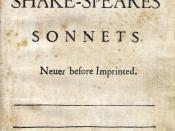In William Shakespeare's Sonnet 87, Shakespeare appears to be bidding goodbye to the mysterious young man whom he writes so much about. The opening word of 'Farewell' could almost stand as a sufficient summary to the entire poem. As in Shakespeare's previous sonnets about the young man, it is in Sonnet 87 when the poet realizes the relationship has collapsed and that he needs to bid farewell to his young love. Shakespeare himself appears to be the speaker in the poem, whereas the young man is to whom Shakespeare is conveying his message.
In the first quatrain, the poet unmistakably bids farewell to the young man. "Farewell, thou are too dear for my possession, And like enough thou know'st thy estimate. The charter of thy worth gives thee releasing; My bonds in thee are all determinate." The word dear can be interpreted as he young man being too precious, too costly, and perhaps too damaging for the poet to continue to love.
Lines 2-4 convey the idea that Shakespeare's love wasn't good enough for the young man and that all "bonds", or contracts, whether they be legal, financial, or emotional, are terminated.
The first quatrain also presents several symbolic images. Line 1 almost seems paradoxical, something Shakespeare used very often his is poems and plays. The paradox can been see as if Shakespeare were saying that his love is so strong for the young man that he would not be able to have the young man if given the opportunity. The third and fourth lines revert to a legal impression, where Shakespeare uses the words "charter" and "bonds."
The second quatrain further explains Shakespeare reasons for saying goodbye to the young man. "For how do I hold thee but thy granting, And for that riches where is my deserving?...



"Explication on Sonnet 87"
This would have been an even greater paper than it already is if you had included some sort of intro - popping right into the body of the paper was a little odd.
1 out of 1 people found this comment useful.